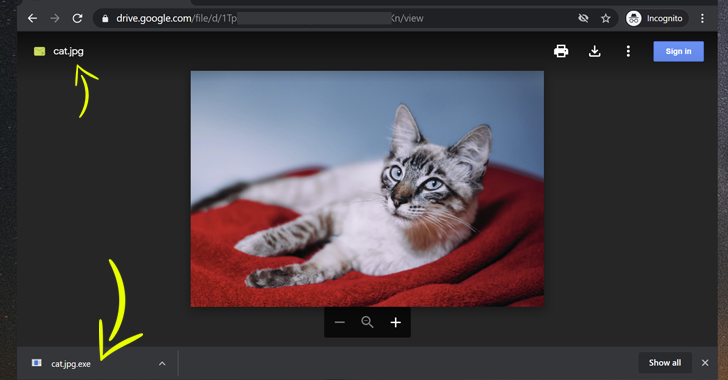The latest security issue—of which Google is aware but, unfortunately, left unpatched—resides in the "manage versions" functionality offered by Google Drive that allows users to upload and manage different versions of a file, as well as in the way its interface provides a new version of the files to the users.
Logically, the manage versions functionally should allow Google Drive users to update an older version of a file with a new version having the same file extension, but it turns out that it's not the case.
According to A. Nikoci, a system administrator by profession who reported the flaw to Google and later disclosed it to The Hacker News, the affected functionally allows users to upload a new version with any file extension for any existing file on the cloud storage, even with a malicious executable.
As shown in the demo videos—which Nikoci shared exclusively with The Hacker News—in doing so, a legitimate version of the file that's already been shared among a group of users can be replaced by a malicious file, which when previewed online doesn't indicate newly made changes or raise any alarm, but when downloaded can be employed to infect targeted systems.
"Google lets you change the file version without checking if it's the same type," Nikoci said. "They did not even force the same extension."
Needless to say, the issue leaves the door open for highly effective spear-phishing campaigns that take advantage of the widespread prevalence of cloud services such as Google Drive to distribute malware.
The development comes as Google recently fixed a security flaw in Gmail that could have allowed a threat actor to send spoofed emails mimicking any Gmail or G Suite customer, even when strict DMARC/SPF security policies are enabled.
Malware Hackers Love Google Drive.
Spear-phishing scams typically attempt to trick recipients into opening malicious attachments or clicking seemingly innocuous links, thereby providing confidential information, like account credentials, to the attacker in the process.
The links and attachments can also be used to get the recipient to unknowingly download malware that can give the attacker access to the user's computer system and other sensitive information.
This new security issue is no different. Google Drive's file update feature is meant to be an easy way to update shared files, including the ability to replace the document with a completely new version from the system. This way, the shared file can be updated without changing its link.
However, without any validation for file extensions, this can have potentially serious consequences when users of the shared file, who, upon notification of the change via an email, end up downloading the document and unwittingly infecting their systems with malware.
Such a scenario could be leveraged to mount whaling attacks, a phishing tactic often used by cyber-criminal gangs to masquerade as senior management personnel in an organization and target specific individuals, hoping to steal sensitive information or gain access to their computer systems for criminal purposes.
Even worse, Google Chrome appears to implicitly trust the files downloaded from Google Drive even when they are detected by other antivirus software as malicious.
Cloud Services Become An Attack Vector.
Although there's no evidence that this flaw has been exploited in the wild, it wouldn't be difficult for attackers to repurpose it for their benefit given how cloud services have been a vehicle for malware delivery in several spear-phishing attacks in recent months.
Earlier this year, Zscaler identified a phishing campaign that employed Google Drive to download a password stealer post initial compromise.
Last month, Check Point Research and Cofense highlighted a series of new campaigns wherein threat actors were found not only using spam emails to embed malware hosted on services like Dropbox and Google Drive but also exploiting cloud storage services to host phishing pages.
ESET, in an analysis of the Evilnum APT group, observed a similar trend where fintech companies in Europe and the UK have been targeted with spear-phishing emails that contain a link to a ZIP file hosted on Google Drive to steal software licenses, customer credit card information, and investments and trading documents.
Likewise, Fortinet, in a campaign spotted earlier this month, uncovered evidence of a COVID-19-themed phishing lure that purportedly warned users of delayed payments due to the pandemic, only to download the NetWire remote access Trojan hosted on a Google Drive URL.
With scammers and criminals pulling out all the stops to conceal their malicious intentions, it's essential that users keep a close eye on suspicious emails, including Google Drive notifications, to mitigate any possible risk.
THN
#osutayusuf
- Get link
- X
- Other Apps
- Get link
- X
- Other Apps


Comments
Post a Comment